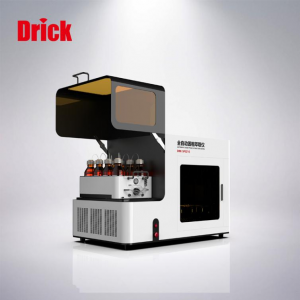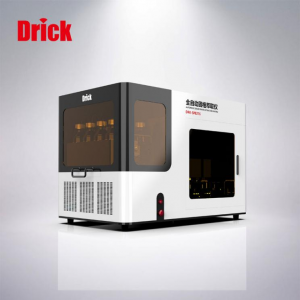DRK-SPE216 Automatic Solid-Phase Extraction instrument (SPE) is widely used in the fields of environmental science and technology and resource science and technology, its principle is based on the theory of liquid-solid phase chromatography, using selective adsorption and selective elution for sample enrichment, separation and purification.
Solid phase extractor uses solid adsorbent to adsorb the target compound in the liquid sample, separate it from the matrix and interference compound of the sample, and then eluate it with eluent to achieve the purpose of separation and enrichment.
Precise speed control: Support large volume injection and positive pressure elution to avoid cross contamination.
Stepless CNC operation: large screen display, touch screen and button compatible operation, easy to operate.
Corrosion resistance design: chassis phosphating and multi-layer epoxy resin spraying treatment, small column joint resistant to acid and alkali, organic solvents, oxidant corrosion.
High efficiency and stability: The use of high-precision CNC technology motor, low energy consumption, low noise, speed control more accurate.
High degree of automation: fully automatic operation of the whole process of solid phase extraction can be realized, improving work efficiency.
DRK-SPE216 automatic solid phase extractor is characterized by high efficiency, simplicity and good repeatability.
Water quality monitoring: detection of organic pollutants, heavy metals, pesticides, drug residues in water samples.
Soil and sediment analysis: Extraction of organic pollutants, polycyclic aromatic hydrocarbons (PAHS), polychlorinated biphenyls (PCBs) from soil and sediment.
Food detection: analysis of pesticide residues in food, veterinary drug residues, food additives, mycotoxins, etc.
Agricultural water and soil testing: Monitoring contaminants in the agricultural environment.
Drug analysis: Detection of drugs and their metabolites in biological samples such as blood and urine.
Toxicological analysis: Detection of poisons and drug overdoses in biological samples.
Oil analysis: Detection of contaminants and additives in petroleum products.
Environmental monitoring: Assessing the impact of environmental events such as oil spills on the environment.
Advantages: high degree of automation, improve work efficiency. Easy to operate, reduce the difficulty of operation. Improve analysis efficiency and shorten experiment time. Reduce the error and ensure the accuracy and repeatability of the experimental results. Cost saving, support for simultaneous processing of multiple samples,
Disadvantages: Relatively high price, high manufacturing costs. The adaptability to samples and solvents is limited, which may affect the extraction effect in certain circumstances. The maintenance cost is high, requiring professional operation and maintenance.
Post time: Oct-15-2024






